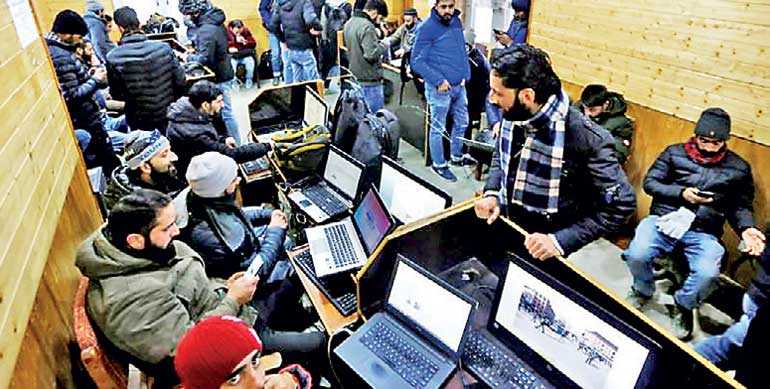Tuesday Feb 24, 2026
Tuesday Feb 24, 2026
Monday, 13 January 2020 09:08 - - {{hitsCtrl.values.hits}}

Journalists use the internet as they work inside a government-run media centre in Srinagar, 10 January - Reuters
NEW DELHI/SRINAGAR (Reuters): The Supreme Court said on Friday that an indefinite shutdown of the internet in Kashmir was illegal, rebuking the Government for the communications lockdown imposed after it withdrew the Muslim majority region’s autonomy in August.
Internet suspensions can be imposed only for “temporary duration” and an indefinite suspension violated India’s telecoms rules, the court said in an order published on its website.
It also ordered authorities to review all such curbs in Kashmir immediately.
Authorities must consider immediately allowing the functioning of essential internet services such as for hospitals and limited e-banking in regions where internet cannot be restored right away, the court added.
“Freedom of Internet access is a fundamental right,” Supreme Court justice N.V. Ramana said.
Prime Minister Narendra Modi’s Hindu-nationalist government has frequently used internet shutdowns as a tool to quell dissent in troubled parts of the country.
Last month, authorities imposed an internet clampdown in parts of the capital and in areas of Assam and Uttar Pradesh as protests raged against a new citizenship law that Muslims see as discriminatory.
The shutdown in Kashmir, which has been on for more than 150 days, is the longest such outage in any democracy, according to digital rights group Access Now.
The Government has argued that the blackout in Kashmir was needed to maintain order in a Himalayan region where security forces have been fighting a long-running separatist insurgency encouraged by neighbouring Pakistan.
NEW DELHI (Reuters): One woman reported a rape every 15 minutes on an average in India in 2018, according to government data released on Thursday, underlining its dismal reputation as one of the worst places in the world to be female.
The highly publicised gang rape and murder of a woman in a bus in New Delhi in 2012 brought tens of thousands onto the streets across India and spurred demands for action from film stars and politicians, leading to harsher punishments and new fast-track courts. But the violence has continued unabated.
Women reported almost 34,000 rapes in 2018, barely changed from the year before. Just over 85% led to charges, and 27% to convictions, according to the annual crime report released by the Ministry of Home Affairs.
Women’s rights groups say crimes against women are often taken less seriously, and investigated by police lacking in sensitivity.